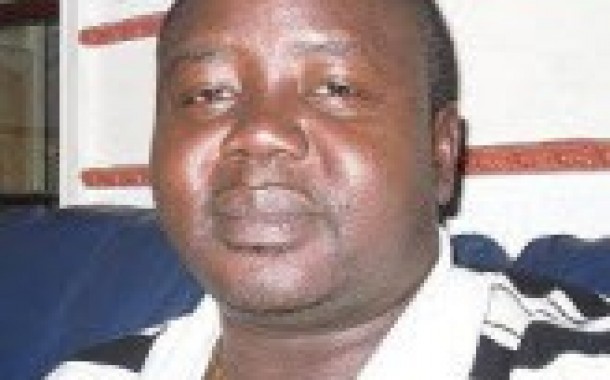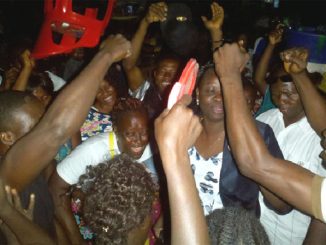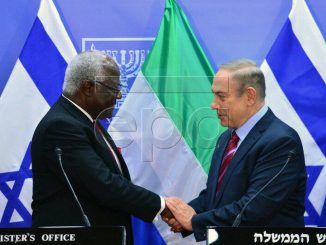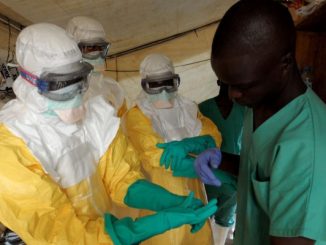
Will Those Who Make Peaceful Evolutions Impossible, Make Violent Revolutions Inevitable?
Alpha Conde, the president of Guinea recently received an endorsement from his RPG governing party to run for the 3rd time in the forthcoming Presidential elections. This was a man who spent a big chunk of his adult life opposing successive regimes in Guinea. After the demise of President Shekou Toure (RIP), Alpha Conde unsuccessfully ran twice against President Lansana in 1993 and 1998. When you consider that Guinea gained independence in 1958, but that Alpha Conde became the 4th President of the country’s history, you get a flavour of how autocratic-friendly their politics has been.

Alpha Conde was freely elected president in 2010; thanks to a second round of voting, an one of the cardinal promises Conde made to his people was to “strengthen Guinea as a democracy and fight corruption”. Does that ring a bell? This is the collective mantra we have all come to expect and hear from incoming regimes all over Africa. Interestingly, the outcomes have been predictably the same.
He was last elected in his second term in 2015; his mandate due to end this year. This was supposed to be his last term. But in March this year, he performed a triple bypass surgery on the constitution without any anaesthetic. This is how the surgery went. Like the old constitution, the new Presidential terms were limited to two terms. But unlike the old constitution, the Presidential terms were extended from five to six
years.
This surgery was approved by a referendum, which the opposition boycotted. By some strange political Pythagoras theorem in the new constitution, Alpha Conde will be free to contest the next election as a new, fresh and an unadulterated candidate, simply because of an additional twelve months. Conde is 82 years old and ticking, and if he contests and wins as some expect, he could stay in power for another twelve years. You do the maths.
The Guinean Prime Minister Kassory Fofana proclaimed his support for the President during the Party convention last week. In his endorsement speech, Kassory stated that “This is the starting point today for a new, bright and promising future for Guinea and Guineans. We are proud to be the vectors of this new hope for our country and our people,”. When you recall that Africa has been tantalisingly toying with the new wind of change for two term limits for Presidents, this sleight of hand by Conde sends the wrong message across the region. The two-term limit was seemingly a perfect antidote for coup d’états; a feature that was prevalent in the early years of post colonial Africa. But this new found Presidential term time limits is slowly, surely and insidiously coming under serious threat.
In neighbouring Cote D’Ivoire, protesters took to the streets on Thursday; a culmination of sporadic opposition to President Allassane Quattara’s decision to stand for the third term in the October 31 elections. Like most African countries, Cote D’Ivoire law limits presidential terms to two. But like his Francophone cousin is Guinea, Quattara is saying that a new constitution that was adopted in 2016 allows him to run for a third term. Another finger on the reset button of West African democracy.
But the threat against two term limits did not start overnight. The plan to restrict West African Presidents to two term limits was dropped by heads of states for the time being, during a regional summit by ECOWAS in Accra in 2015. Without doubt, this has been controversial among the leaders. Those who oppose the two term limits argue that due to different political contexts, it would be unwise to apply such a blanket rule. These heads are yet to come to a consensus.
In the meantime, Blaise Compoare of Burkina Faso driven out by people power, when he tried the same trick. Burundi President Pierre Nkurunziza faced some protests and a failed coup attempt when he announced his plan to run for a third term. In the face of blind repression and political asphyxiation blowing across the continent, the likes of President Faure Gnassingbe of Togo, who has been in power since 2005 and until recently Yaryah Jammeh, have been employing wordsmiths to perform political alchemy on their constitutions to stay in power; longer than the preferred two term limits.
On the other hand, former leaders like Ernest Koroma of Sierra Leone and Sirleaf Johnson of Liberia served their two terms and left their respective scenes; though one reluctantly and still displaying withdrawal symptoms. Thankfully, both did so without bloodshed. Bravo.
But what is gnawingly frustrating and regrettable is that all these political shenanigans are taking place right under the nose of the so-called African Union (AU), and its step child ECOWAS. Dadis Camara seized power in a coup in December 2008, hours after the death of long-time dictator Lansana Conté. The AU wasted no time to bear pressure on him to give up power as they ramped up threats of sanctions against him. We can all recall the massacre of about 157 people at a pro democracy rally against Dadis. He was later shot by Lieutenant Diakite, who later told the AU investigators that he did so because “there was a complete betrayal in my view, a total betrayal of democracy” by Dadis.The AU was just so happy then to send a commission to investigate the massacre.
When Major General Sibusiso Moyo went on air to say that the military was targeting “criminals” around President Mugabe in 2017, and even though he insisted that it was not a military take-over of the government, the AU unanimously described it as a coup, and demanded the “immediate return to constitutional order .”Guess who was the head of the AU at the time?. You guessed right, Alpha Conde. Former President Koroma was among the few heads of state, if not the only one to criticise Robert Mugabe during the AU summit at the resort of Sharm El Sheikh in Egypt, when Mugabe stole one of his numerous election victories. Koroma famously said that “the people of Zimbabwe have been denied their democratic rights. We should in no uncertain terms condemn what has happened.”
But it is looking increasingly realistic that the hysteria and euphoria that greeted Africa’s adoption of two term presidential limits is under serious threat. What many hailed as the renaissance of democracy in Africa is at risk of returning to precolonial resets. African leadership has historically been exercised along the corridors of dynasties, kingdoms, clans and hereditary lines. Are we by implication, saying that we are incapable adopting change for a better or different form of self governance?
Noticed something? When Dadis and the Zimbabwean military intervened, the AU was quick to act. The leaders in the AU saw themselves as direct targets. To allow the likes of Dadis and General Sibusiso Moyo was tantamount to a carte blanche for military intervention in our political system. This would have tempted others to follow suit and threaten the lives of the very members of the AU and its subsidiaries. We saw how they acted swiftly to condemn and put pressure on both to return their countries to normal service. Talk about the society for self preservation.
But now that these same leaders are fidgeting their respective constitutions to stay in power, the AU and its subsidiary bodies have adopted a policy selective myopia and mutism. By doctoring the constitutions to circumvent the two term limits, they seem to say that “if the people have learnt to shoot without missing, they have learnt to fly without perching”. In the absence of a responsible action from these organisations, It has been left to the ordinary citizens to demand democracy by way of protests and the inherent loss of lives.
But should the blood of the African be the currency on the stock exchange of African democracy? Should we continue to look to our regional organisations for leadership, when they have become selectively blind and mute to the predicaments we are facing? Are these organisations just talking shops, if they cannot oversee a common political ethos for the continent? But again, as a society for self preservation, some will say that it is too presumptuous to expect them to intervene. It is like asking foxes to vote for the welfare of chickens. You don’t expect turkeys to vote for Christmas or Thanksgiving Day.
No one wants or wishes for the return to Coup d’états, civil wars, insurrections, etc. But JF Kennedy once said that “Those who make peaceful revolution impossible will make violent revolution inevitable.” Ask Blaise Compoare. The ballot is stronger than the bullet. But if our political leaders are becoming constitutional Houdinis and making peaceful political evolutions impossible, will coups, and otherwise be unavoidable? We hope to God no and we oppose such threats. But should our leaders and regional bodies be doing more to stop the likes of Alpha Conde, Allassane Quattara, to name but a few, from adulterating our democracies for the common good?
Don’t forget to turn the lights off when you leave the room.
Abdulai Mansaray.



